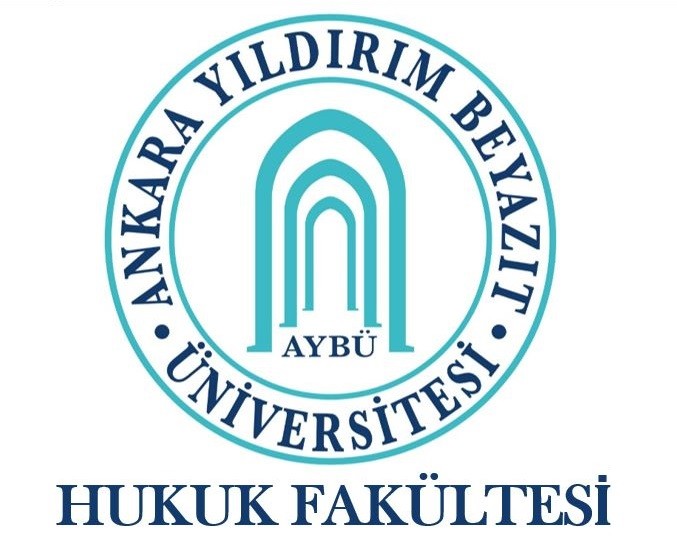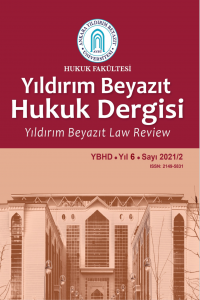Abstract
In many of the decisions and judgments rendered in the first five years of the individual application mechanism, the Turkish Constitutional Court (“the Court”) has employed the notions of “prohibition of torture” or “prohibition of torture and ill-treatment” and accepted the terminology in the national and international literature in human rights law. However, in its judgments rendered after 21 February 2019, the Court has adopted a new terminology which excludes the term “torture”. Such exclusion could be a disoriented initiative that may jeopardize the absolute nature of the prohibition of torture that seeks to protect human dignity. The words are like the flesh and bones of thoughts. Every discipline has its own specific terminology. Also taking into account the philosophy of language, this paper deals with the causes and possible consequences of such shift by the Court.
Keywords
Human Rights Prohibition of Torture Semantic Departure Denominate The Turkish Constitutional Court
References
- Anayurt, Ömer (2000) “Hakların Bütünlüğü İlkesi Açısından İnsan Haklarına İlişkin Sınıflandırmaların Değerlendirilmesi”: Türkiye’de İnsan Hakları Konferansı, Ankara, TODAİE, s. 47-57.
- Anayurt, Ömer (2008) “Avrupa İnsan Hakları Mahkemesi İçtihatlarında İşkence Kavramı”, Gazi Üniversitesi Hukuk Fakültesi Dergisi (Prof. Dr. Atilla Özer’e Armağan) C: 12, S: 1, 2, s. 421-459.
- Anayurt, Ömer (2009) “İnsan Hakları Bölgesel Koruma Sistemlerinde İşkence ve Kötü Muamele Yasağı”: Doğan, İlyas (Editör) İşkencenin Önlenmesi ve İstanbul Protokolü, Ankara, Adalet Bakanlığı Eğitim Dairesi Başkanlığı, s. 181-212.
- Boyar, Oya (2013) “İşkence ve Kötü Muamele Yasağı”: İnceoğlu, Sibel (Editör) Avrupa İnsan Hakları Sözleşmesi ve Anayasa, Anayasa Mahkemesine Bireysel Başvuru Kapsamında Bir İnceleme, Ankara, Avrupa Konseyi, s. 137-157.
- Doğan, İlyas (2015) “İnsan Hakları Hukukunun Temel Kavramları ve Özellikleri”: Doğan, İlyas (Editör) İnsan Hakları Hukuku, 2. Baskı, Ankara, Astana Yayınları, s. 43-75.
- Doğru, Osman (2006) İnsan Hakları Avrupa Sözleşmesi Hukukunda İşkence ve Kötü Muamele Yasağı, İstanbul, Legal Yayıncılık.
- Doğru, Osman/Nalbant, Atilla (2012) Avrupa İnsan Hakları Sözleşmesi Açıklama ve Önemli Kararlar, 1. Cilt, İstanbul, Avrupa Konseyi.
- Gemalmaz, Mehmet Semih (1998) “İnsan Hakları: Temellendirilmesinden Tanımlanmasına”, Bahri Savcı’ya Armağan, Ankara, Mülkiyeliler Birliği Vakfı Yayınları, s. 244-259.
- Harris, David/O’Boyle, Michael/Bates, Ed/Buckley, Carla (2009) Law of the European Convention on Human Rights, 2. Baskı, Oxford, Oxford University Press (Çeviren: Kılcı, Mehveş Bingöllü/Karan, Ulaş (2013) Avrupa İnsan Hakları Sözleşmesi Hukuku, 1. Baskı, Avrupa Konseyi).
- Heper, Altan (2012) “Kültürlerarası İlişki Bağlamında İnsan Onuru”, Hukuk Felsefesi ve Sosyolojisi Arşivi (Prof. Dr. Adnan Güriz Anısına) 24. Kitap, İstanbul Barosu Yayınları, s. 15-27.
- Hobbes, Thomas (1977) Leviathan; Or the Matter, Form and Power of a Commonwealth Ecclesiastical and Civil, 13. Baskı, New York, Collier Books, (Çeviren: Lim, Semih (2017) Leviathan veya Bir Din ve Dünya Devletinin İçeriği, Biçimi ve Kudreti, 15. Baskı, İstanbul, Yapı Kredi Yayınları).
- Özlem, Doğan (2016) Mantık, 16. Baskı, İstanbul, Notos Kitap Yayınevi.
- Platon (2016) Kratylos, Giriş, Metin, Çeviri ve Dizinler, 1. cilt, (Eski Yunanca aslından çeviren: Gören, Erman) İstanbul, Dergâh Yayınları.
- Renan, Ernest (1848) De l’origine du langage, (Çeviren: Altınörs, Atakan (2015) Dilin Kökeni Üzerine, 2. Baskı, İstanbul, Bilge Kültür Sanat Yayınevi).
- Rousseau, Jean-Jacques (1990) Essai sur l'origine des langues où il est parlé de la mélodie et de l'imitation musicale, Folio Essais, (Çeviren: Albayrak, Ömer (2017) Melodi ve Müziksel Taklit ile İlişkisi İçinde Dillerin Kökeni Üstüne Deneme, 6. Baskı, İstanbul, Türkiye İş Bankası Yayınları).
- Sancar, Mithat (2014) “Devlet Aklı” Kıskacında Hukuk Devleti, 7. Baskı, İstanbul, İletişim Yayınları.
- Scott, George Ryley (1995) A History of Torture, Christchurch Publishers Ltd, (Çeviren: Koyukan, Hamide (2001) İşkencenin Tarihi, Ankara, Dost Kitabevi).
Abstract
Anayasa Mahkemesi, ilk beş yılda verdiği bireysel başvuru kararlarının çoğunda insan hakları hukukunda ulusal ve uluslararası literatür tarafından genel kabul görmüş “işkence yasağı” ya da “işkence ve kötü muamele yasağı” kavramını kullanmıştır. 21.2.2019 tarihinden sonra verdiği kararlarda ise işkence kelimesinden arındırılmış bir adlandırma yöntemi benimsemiştir. “İşkence” kelimesinin dışlandığı bu yeni adlandırma insan onurunu koruma gayesi güden “işkence yasağı”nın mutlaklığına da zarar verebilecek bir girişimdir. Kelimeler düşüncenin giydirildiği kıyafetler gibidir. Her bilim dalının kendine özgü terimleri bulunmaktadır. Çalışmada, hukukta terim hâline gelmiş, bizzat kendisi tarafından benimsenmiş bir ifade tarzının semantik olarak en üst yargı yerince değiştirilmesinin dil felsefesi de dikkate alınarak nedenleri ve potansiyel sonuçları ele alınmıştır.
References
- Anayurt, Ömer (2000) “Hakların Bütünlüğü İlkesi Açısından İnsan Haklarına İlişkin Sınıflandırmaların Değerlendirilmesi”: Türkiye’de İnsan Hakları Konferansı, Ankara, TODAİE, s. 47-57.
- Anayurt, Ömer (2008) “Avrupa İnsan Hakları Mahkemesi İçtihatlarında İşkence Kavramı”, Gazi Üniversitesi Hukuk Fakültesi Dergisi (Prof. Dr. Atilla Özer’e Armağan) C: 12, S: 1, 2, s. 421-459.
- Anayurt, Ömer (2009) “İnsan Hakları Bölgesel Koruma Sistemlerinde İşkence ve Kötü Muamele Yasağı”: Doğan, İlyas (Editör) İşkencenin Önlenmesi ve İstanbul Protokolü, Ankara, Adalet Bakanlığı Eğitim Dairesi Başkanlığı, s. 181-212.
- Boyar, Oya (2013) “İşkence ve Kötü Muamele Yasağı”: İnceoğlu, Sibel (Editör) Avrupa İnsan Hakları Sözleşmesi ve Anayasa, Anayasa Mahkemesine Bireysel Başvuru Kapsamında Bir İnceleme, Ankara, Avrupa Konseyi, s. 137-157.
- Doğan, İlyas (2015) “İnsan Hakları Hukukunun Temel Kavramları ve Özellikleri”: Doğan, İlyas (Editör) İnsan Hakları Hukuku, 2. Baskı, Ankara, Astana Yayınları, s. 43-75.
- Doğru, Osman (2006) İnsan Hakları Avrupa Sözleşmesi Hukukunda İşkence ve Kötü Muamele Yasağı, İstanbul, Legal Yayıncılık.
- Doğru, Osman/Nalbant, Atilla (2012) Avrupa İnsan Hakları Sözleşmesi Açıklama ve Önemli Kararlar, 1. Cilt, İstanbul, Avrupa Konseyi.
- Gemalmaz, Mehmet Semih (1998) “İnsan Hakları: Temellendirilmesinden Tanımlanmasına”, Bahri Savcı’ya Armağan, Ankara, Mülkiyeliler Birliği Vakfı Yayınları, s. 244-259.
- Harris, David/O’Boyle, Michael/Bates, Ed/Buckley, Carla (2009) Law of the European Convention on Human Rights, 2. Baskı, Oxford, Oxford University Press (Çeviren: Kılcı, Mehveş Bingöllü/Karan, Ulaş (2013) Avrupa İnsan Hakları Sözleşmesi Hukuku, 1. Baskı, Avrupa Konseyi).
- Heper, Altan (2012) “Kültürlerarası İlişki Bağlamında İnsan Onuru”, Hukuk Felsefesi ve Sosyolojisi Arşivi (Prof. Dr. Adnan Güriz Anısına) 24. Kitap, İstanbul Barosu Yayınları, s. 15-27.
- Hobbes, Thomas (1977) Leviathan; Or the Matter, Form and Power of a Commonwealth Ecclesiastical and Civil, 13. Baskı, New York, Collier Books, (Çeviren: Lim, Semih (2017) Leviathan veya Bir Din ve Dünya Devletinin İçeriği, Biçimi ve Kudreti, 15. Baskı, İstanbul, Yapı Kredi Yayınları).
- Özlem, Doğan (2016) Mantık, 16. Baskı, İstanbul, Notos Kitap Yayınevi.
- Platon (2016) Kratylos, Giriş, Metin, Çeviri ve Dizinler, 1. cilt, (Eski Yunanca aslından çeviren: Gören, Erman) İstanbul, Dergâh Yayınları.
- Renan, Ernest (1848) De l’origine du langage, (Çeviren: Altınörs, Atakan (2015) Dilin Kökeni Üzerine, 2. Baskı, İstanbul, Bilge Kültür Sanat Yayınevi).
- Rousseau, Jean-Jacques (1990) Essai sur l'origine des langues où il est parlé de la mélodie et de l'imitation musicale, Folio Essais, (Çeviren: Albayrak, Ömer (2017) Melodi ve Müziksel Taklit ile İlişkisi İçinde Dillerin Kökeni Üstüne Deneme, 6. Baskı, İstanbul, Türkiye İş Bankası Yayınları).
- Sancar, Mithat (2014) “Devlet Aklı” Kıskacında Hukuk Devleti, 7. Baskı, İstanbul, İletişim Yayınları.
- Scott, George Ryley (1995) A History of Torture, Christchurch Publishers Ltd, (Çeviren: Koyukan, Hamide (2001) İşkencenin Tarihi, Ankara, Dost Kitabevi).
Details
| Primary Language | Turkish |
|---|---|
| Subjects | Law in Context |
| Journal Section | PUBLIC LAW |
| Authors | |
| Publication Date | July 31, 2021 |
| Published in Issue | Year 2021 Issue: 2 |
Cite



